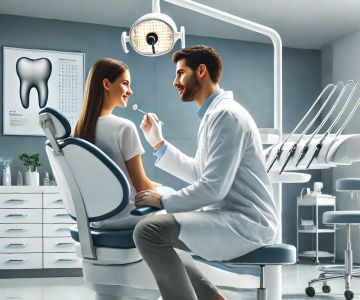Understanding How a Dentist Checks for Oral Cancer
Oral cancer can be a life-threatening condition, but like many other types of cancer, early detection is key to successful treatment. During routine dental visits, dentists often perform a thorough examination to detect any signs of oral cancer. While you might be aware of routine cleanings and cavity checks, you might not be fully informed about how a dentist checks for oral cancer. In this article, I'll take you through the process, explain what dentists look for, and give you a deeper understanding of this crucial aspect of your dental care.
What is Oral Cancer?
Oral cancer includes cancers of the mouth, tongue, lips, gums, and the floor of the mouth. It’s important to note that it’s not just about the teeth. The tissues inside your mouth and the structures that surround it can also be affected. This is why regular checks by your dentist are vital for maintaining not only the health of your teeth but also the overall health of your oral cavity.
The Dentist’s Role in Oral Cancer Detection
When you visit your dentist, they will look for any abnormal signs that could suggest cancer or precancerous changes. The process of checking for oral cancer is simple, non-invasive, and often incorporated into regular dental exams.
Step 1: Physical Examination
During the exam, your dentist will visually inspect all areas of your mouth, including your lips, tongue, gums, the roof of your mouth, and the floor of your mouth. They will be looking for:
- Unusual lumps or bumps in the mouth or neck area
- Changes in the color or texture of the tissues in your mouth
- Ulcers or sores that do not heal
- Red or white patches inside the mouth or on the tongue
Any abnormalities or unusual findings will be documented, and the dentist may suggest further tests or a biopsy for further analysis.
Step 2: Palpation (Physical Touch)
Another important aspect of the examination is palpation. Your dentist will use their hands to feel for abnormalities in the neck, jaw, and the soft tissues inside your mouth. They may gently press on the outside of your neck to check for lumps or swollen lymph nodes, which can sometimes indicate the presence of cancer.
Step 3: Checking the Floor of the Mouth and Tongue
One of the most common places for oral cancer to develop is the floor of the mouth or on the tongue. Your dentist will use a tongue depressor to hold down your tongue and look carefully at both the underside and the sides. They’ll also use their hands to feel the area beneath your tongue to detect any lumps, swelling, or unusual tissue.
Step 4: Examination of the Gums and Teeth
Your dentist will check the condition of your gums, paying close attention to any signs of gum disease or changes in color and texture. In some cases, oral cancer can start in the gum tissues, which is why this area is thoroughly examined.
Signs and Symptoms to Watch For
While it’s essential to have regular dental exams to catch early signs of oral cancer, being aware of potential warning signs yourself can be equally important. If you experience any of the following, make sure to mention them to your dentist:
- Persistent mouth sores that do not heal after two weeks
- Unexplained bleeding in the mouth
- Pain or difficulty swallowing or chewing
- A lump in the neck or jaw
- Persistent hoarseness or a sore throat
Why Early Detection Matters
Early-stage oral cancer is much easier to treat and can significantly improve your chances of survival. Dentists are trained to spot early signs that might be missed during self-examination or general health checkups. Catching the disease in its earliest stages can lead to less invasive treatments and a better overall prognosis.
What Happens If a Dentist Finds Something Suspicious?
If your dentist detects anything unusual during the oral cancer exam, they will likely refer you to a specialist, such as an oral surgeon or an oncologist, for further testing. The specialist may perform a biopsy to determine if the abnormal area is cancerous. Early intervention, including surgery or radiation therapy, may be required to treat the condition effectively.
How Often Should You Have an Oral Cancer Screening?
Oral cancer screenings are typically part of a routine dental visit, which most people should have every six months. However, if you have a history of tobacco or alcohol use, a family history of cancer, or other risk factors, your dentist might recommend more frequent exams. It's essential to keep up with regular dental appointments to ensure your oral health is maintained and that any potential problems are identified early.
Conclusion: Take Control of Your Oral Health
By regularly visiting your dentist and having oral cancer screenings, you can ensure that you’re taking proactive steps to protect your health. Oral cancer is serious, but it’s also preventable and treatable when caught early. Don’t ignore any signs or symptoms, and always prioritize your dental visits to stay on top of your oral health. Trust your dentist to guide you through the process and give you peace of mind knowing that your oral health is in good hands.





 Westgate Dental Arts
Westgate Dental Arts Coventry Family Dental
Coventry Family Dental Familia Dental
Familia Dental Dr. Daniel S. Fife, DDS
Dr. Daniel S. Fife, DDS Dentistry At Suburban Square: Michael I. Wollock, DMD
Dentistry At Suburban Square: Michael I. Wollock, DMD Comfort Care Dental
Comfort Care Dental The Importance of Oral Health Education During Pregnancy for a Healthy Pregnancy
The Importance of Oral Health Education During Pregnancy for a Healthy Pregnancy Why Skipping Dental Checkups Can Lead to Bigger Oral Health Problems
Why Skipping Dental Checkups Can Lead to Bigger Oral Health Problems Advantages of Porcelain Dental Restorations
Advantages of Porcelain Dental Restorations Best Tips for Brushing Your Teeth Properly for Healthy Gums: Essential Techniques for Oral Health
Best Tips for Brushing Your Teeth Properly for Healthy Gums: Essential Techniques for Oral Health How Can Diabetes Cause Tooth and Gum Problems? Preventing and Managing Oral Health Issues
How Can Diabetes Cause Tooth and Gum Problems? Preventing and Managing Oral Health Issues Healthy Habits for Promoting Good Oral Health and Hygiene: Tips for a Healthy Smile
Healthy Habits for Promoting Good Oral Health and Hygiene: Tips for a Healthy Smile